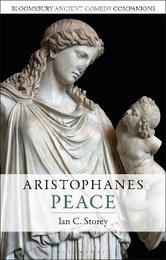
|
Aristophanes: Peace
Paperback / softback
Main Details
Description
This is the first volume dedicated to Aristophanes' comedy Peace that analyses the play for a student audience and assumes no knowledge of Greek. It launches a much-needed new series of books each discussing a comedy that survives from the ancient world. Six chapters highlight the play's context, themes, staging and legacy including its response to contemporary wartime politics and the possible staging options for flying. It is ideal for students, but helpful also for scholars wanting a quick introduction to the play. Peace was first performed in 421 BC, perhaps only days before the signing of a peace treaty that ended ten years of fighting between Athens and Sparta (the Archidamian War). Aristophanes celebrates this prospect with an imaginative fantasy involving his hero's flight on a gigantic dung-beetle to Olympus, the rescue of the goddess Peace from her imprisonment in a cave, and her return to a Greece weary of ten years of war. Like most of the poet's comedies, this play is heavy on fantasy and imagination, light on formal structure, being an exuberant farce that champions the opponents of War and celebrates the delights of the return to country life with its smells, food and drink, its many pleasures and none of the complications that war brings in its wake.
Author Biography
Ian C. Storey is Emeritus Professor of Ancient Greek and Roman Studies at Trent University, Ontario, Canada.
ReviewsAn affordable and informative handbook ... that effectively sets out the historical context and textual complexity of one of Aristophanes' more sincerely absurd comedies. * Classics for All * This book is an excellent introduction to both the Peace and Old Comedy as a whole. * Journal of Hellenic Studies * Storey presents here a very clear summary ... [It is] not only a very good introduction to Peace, but more generally to the genre of old comedy. * Revue des Etudes Anciennes * Storey's companion is the first full-scale study in English of this often ignored play, with particularly valuable treatments of its thematics, its staging and its reception. -- Alan Sommerstein, Emeritus Professor of Greek, University of Nottingham, UK
|